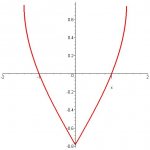red and white kop!
Junior Member
- Joined
- Jun 15, 2009
- Messages
- 231
find d^2/dx^2 as a function of x if siny + cosy = x
i tried to solve this problem this way
differentiating once makes cos y (dy/dx) - sin y (dy/dx) = 1
dy/dx (cos y - siny) = 1
differentiating this makes d^2y/dx^2 (cosy - siny) -dy/dx (sin y + cos y) = 0
d^2y/dx^2 (cos y -siny) - x(dy/dx) = 0
from there i isolate d^2y/dx^2, but apparently its wrong
can anyone help?
i tried to solve this problem this way
differentiating once makes cos y (dy/dx) - sin y (dy/dx) = 1
dy/dx (cos y - siny) = 1
differentiating this makes d^2y/dx^2 (cosy - siny) -dy/dx (sin y + cos y) = 0
d^2y/dx^2 (cos y -siny) - x(dy/dx) = 0
from there i isolate d^2y/dx^2, but apparently its wrong
can anyone help?

